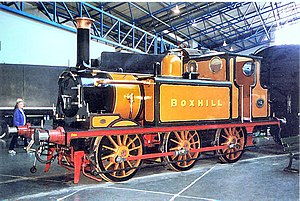LB&SCR A1 class

Boxhill is preserved as part of the National Collection at the National Railway Museum.
|
|||||||||||||||||||||||||||||
|
|||||||||||||||||||||||||||||
|
|||||||||||||||||||||||||||||
|
|||||||||||||||||||||||||||||
|
|||||||||||||||||||||||||||||
| Type and origin | |
|---|---|
| Power type | Steam |
| Builder | Brighton works |
| Build date | 1872-1880. |
| Total produced | 50, 17 rebuilt to A1X |
| Specifications | |
|---|---|
| Configuration | 0-6-0T |
| UIC class | C |
| Gauge | 4 ft 8 1⁄2 in (1,435 mm) standard gauge |
| Driver dia. | 48 in (1.219 m) |
| Wheelbase | 12 ft (3.66 m) |
| Length | 26 ft 0 1⁄2 in (7.94 m) |
| Loco weight | 27.5 long tons (27.9 t; 30.8 short tons) A1, 28 long tons (28 t; 31 short tons) A1X |
| Fuel type | Coal |
| Water cap | 500 imp gal (2,300 l; 600 US gal) |
| Firebox: • Firegrate area |
33 sq ft (3.1 m2) |
| Boiler pressure | 150 psi (1.0 MPa) |
| Cylinders | 2 |
| Cylinder size | 12 in × 20 in (305 mm × 508 mm) A1, Various sizes up to 14 3⁄16 in × 20 in (360 mm × 508 mm) A1X |
| Performance figures | |
|---|---|
| Tractive effort | 7,650 lbf (34.0 kN) A1, Various between 7,650 lbf (34.0 kN) and 10,695 lbf (47.57 kN) A1X |
| Career | |
|---|---|
| Operators |
LB&SCR, Southern Railway British Railways |
| Class | A1 |
| Power class |
|
| Withdrawn | 1901–1964 |
| Disposition | 10 preserved, remainder scrapped |
The London, Brighton and South Coast Railway (LB&SCR) A1 Class is an English class of 0-6-0T steam locomotive. Designed by William Stroudley, 50 members of the class were built in 1872 and between 1874 and 1880, all at Brighton Works. The class has received several nicknames, initially being known as "Rooters" by their south London crews. However, the engines were more famously known as "Terriers" on account of the distinctive 'bark' of the exhaust beat. Later in their careers, some engines were known as "Hayling Billy" on account of their work on the Hayling Island branch line. A pub of this name on the island was briefly home to the engine which is now No.W8 Freshwater.
After displacement from their original workings out of London Bridge and London Victoria by more powerful locomotives from the D class and the early stages of the LB&SCR overhead electrification scheme, some representatives of the class were sold to other operators, while the majority of the remainder were put to work on branch lines in Sussex and on non-revenue earning work such as shunting.
With these new uses being found, the class remained in use on the system, surviving to be taken into ownership by the Southern Railway from 1923 and by British Railways from 1948. Although the number of engines dwindled following the Second World War as the work they were used for was either dieselised or lost to rail through the closure of branch lines and yards, a number continued in operation through into the 1960s, most famously on the Hayling Island Branch Line in Hampshire. The withdrawal of the final members of the class finally came in 1963, the line to Hayling having closed in November 1963.
...
Wikipedia
